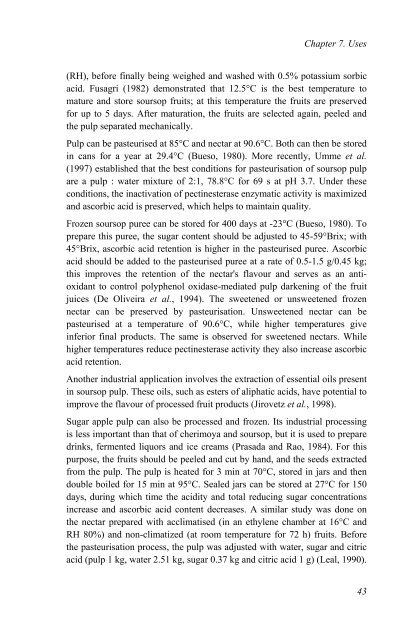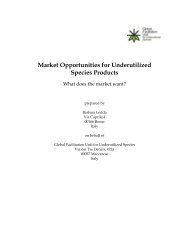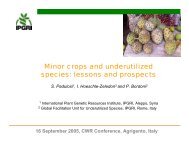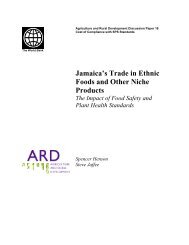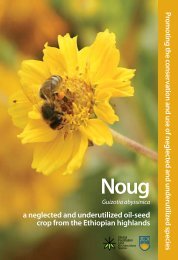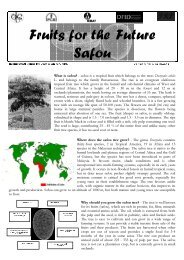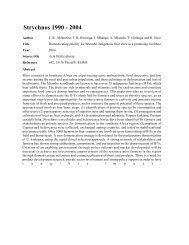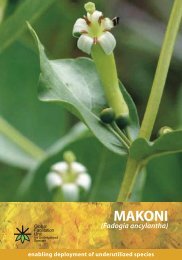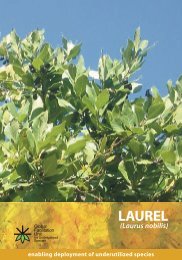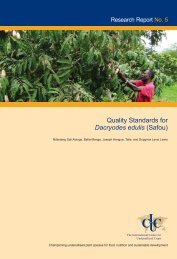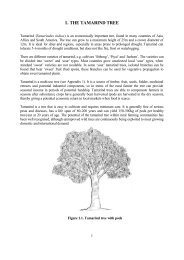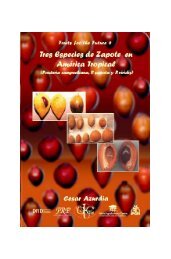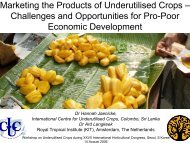Annona Species Monograph.pdf - Crops for the Future
Annona Species Monograph.pdf - Crops for the Future
Annona Species Monograph.pdf - Crops for the Future
You also want an ePaper? Increase the reach of your titles
YUMPU automatically turns print PDFs into web optimized ePapers that Google loves.
Chapter 7. Uses<br />
(RH), be<strong>for</strong>e finally being weighed and washed with 0.5% potassium sorbic<br />
acid. Fusagri (1982) demonstrated that 12.5°C is <strong>the</strong> best temperature to<br />
mature and store soursop fruits; at this temperature <strong>the</strong> fruits are preserved<br />
<strong>for</strong> up to 5 days. After maturation, <strong>the</strong> fruits are selected again, peeled and<br />
<strong>the</strong> pulp separated mechanically.<br />
Pulp can be pasteurised at 85°C and nectar at 90.6°C. Both can <strong>the</strong>n be stored<br />
in cans <strong>for</strong> a year at 29.4°C (Bueso, 1980). More recently, Umme et al.<br />
(1997) established that <strong>the</strong> best conditions <strong>for</strong> pasteurisation of soursop pulp<br />
are a pulp : water mixture of 2:1, 78.8°C <strong>for</strong> 69 s at pH 3.7. Under <strong>the</strong>se<br />
conditions, <strong>the</strong> inactivation of pectinesterase enzymatic activity is maximized<br />
and ascorbic acid is preserved, which helps to maintain quality.<br />
Frozen soursop puree can be stored <strong>for</strong> 400 days at -23°C (Bueso, 1980). To<br />
prepare this puree, <strong>the</strong> sugar content should be adjusted to 45-59°Brix; with<br />
45°Brix, ascorbic acid retention is higher in <strong>the</strong> pasteurised puree. Ascorbic<br />
acid should be added to <strong>the</strong> pasteurised puree at a rate of 0.5-1.5 g/0.45 kg;<br />
this improves <strong>the</strong> retention of <strong>the</strong> nectar's flavour and serves as an antioxidant<br />
to control polyphenol oxidase-mediated pulp darkening of <strong>the</strong> fruit<br />
juices (De Oliveira et al., 1994). The sweetened or unsweetened frozen<br />
nectar can be preserved by pasteurisation. Unsweetened nectar can be<br />
pasteurised at a temperature of 90.6°C, while higher temperatures give<br />
inferior final products. The same is observed <strong>for</strong> sweetened nectars. While<br />
higher temperatures reduce pectinesterase activity <strong>the</strong>y also increase ascorbic<br />
acid retention.<br />
Ano<strong>the</strong>r industrial application involves <strong>the</strong> extraction of essential oils present<br />
in soursop pulp. These oils, such as esters of aliphatic acids, have potential to<br />
improve <strong>the</strong> flavour of processed fruit products (Jirovetz et al., 1998).<br />
Sugar apple pulp can also be processed and frozen. Its industrial processing<br />
is less important than that of cherimoya and soursop, but it is used to prepare<br />
drinks, fermented liquors and ice creams (Prasada and Rao, 1984). For this<br />
purpose, <strong>the</strong> fruits should be peeled and cut by hand, and <strong>the</strong> seeds extracted<br />
from <strong>the</strong> pulp. The pulp is heated <strong>for</strong> 3 min at 70°C, stored in jars and <strong>the</strong>n<br />
double boiled <strong>for</strong> 15 min at 95°C. Sealed jars can be stored at 27°C <strong>for</strong> 150<br />
days, during which time <strong>the</strong> acidity and total reducing sugar concentrations<br />
increase and ascorbic acid content decreases. A similar study was done on<br />
<strong>the</strong> nectar prepared with acclimatised (in an ethylene chamber at 16°C and<br />
RH 80%) and non-climatized (at room temperature <strong>for</strong> 72 h) fruits. Be<strong>for</strong>e<br />
<strong>the</strong> pasteurisation process, <strong>the</strong> pulp was adjusted with water, sugar and citric<br />
acid (pulp 1 kg, water 2.51 kg, sugar 0.37 kg and citric acid 1 g) (Leal, 1990).<br />
43


